

Capital in the Twenty-First Century — Thomas Piketty. Read an excerpt from the Introduction » What are the grand dynamics that drive the accumulation and distribution of capital?
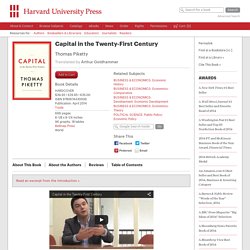
Questions about the long-term evolution of inequality, the concentration of wealth, and the prospects for economic growth lie at the heart of political economy. But satisfactory answers have been hard to find for lack of adequate data and clear guiding theories. In Capital in the Twenty-First Century, Thomas Piketty analyzes a unique collection of data from twenty countries, ranging as far back as the eighteenth century, to uncover key economic and social patterns.
One small study that explodes the myth that inequality is efficient. If you want people to consume less water, there are roughly two ways you could do it.
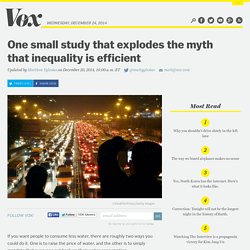
One is to raise the price of water, and the other is to simply mandate that everyone cut back on their water consumption. Either will work, but they work in different ways. And an important recent study from Casey Wichman, Laura Taylor, and Roger von Haefen suggests that the difference in how they work has crucial implications for how we think about a wide variety of issues. When economic inequality is really severe, using prices to regulate the distribution of scarce goods can be seriously unfair.
At the same time, using non-price mechanisms can be seriously inefficient. That means that inequality is preventing us from adopting efficient solutions to a wide variety of problems, ranging from drought response to traffic congestion to climate change. 10 CEOs Who Got Rich By Squeezing Workers. Major Study Links Decline of Unions to Rising of Income Inequality. Study: Income Inequality Kills Economic Growth. Corporate chieftains often claim that fixing the US economy requires signing new free trade deals, lowering government debt, and attracting lots of foreign investment.
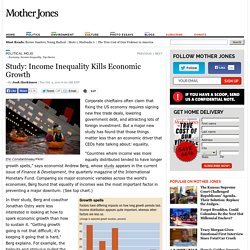
But a major new study has found that those things matter less than an economic driver that CEOs hate talking about: equality. "Countries where income was more equally distributed tended to have longer growth spells," says economist Andrew Berg, whose study appears in the current issue of Finance & Development, the quarterly magazine of the International Monetary Fund. Comparing six major economic variables across the world's economies, Berg found that equality of incomes was the most important factor in preventing a major downturn. (See top chart.) In their study, Berg and coauthor Jonathan Ostry were less interested in looking at how to spark economic growth than how to sustain it.
Stalled upward social mobility in America [UPDATED 2/14/12] Flickr photo by AtleBrunvoll Rana Foroohar’s cover story in TIME (Nov. 2011) is entitled What Ever Happened to Upward Mobility?
![Stalled upward social mobility in America [UPDATED 2/14/12]](http://cdn.pearltrees.com/s/pic/th/stalled-mobility-america-41571464)
Her answer is that it has stalled in the US and fallen behind rates of upward mobility in the US, Sweden or Denmark. According to Foroohar (and based on a Pew study), a male born in the 1970s into the bottom fifth of the wealth distribution had only a 17% chance of making it to the top wealth quintile. And while 50% of young males in this low-wealth quintile remained stuck there in the US, it was only 30% in UK or 25% in Denmark and Sweden, so upward mobility was much higher in those nations.
[Swedish economist Markus Jantti led the research project that uncovered these numbers.] Foroohar (after consulting experts from places like Goldman Sachs) says that China and other emerging countries are driving inequality by taking away good middle class US jobs. Gen Y and Boomers, Suffering the Most. As my colleague Robert Pear reports, a new study from Sentier Research finds that four years after the start of the economic recovery, the median American household income is still down 4.4 percent.
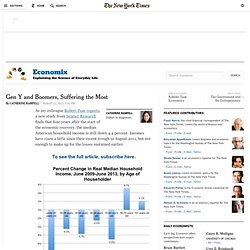
Incomes have risen a little since their recent trough in August 2011, but not enough to make up for the losses sustained earlier. The declines were not distributed evenly. One of the more striking findings from the report was the variation in changes in median income by age group: Source: Sentier Research Those in the 65- to 74-year-old group are the only demographic in the entire study — which also included breakdowns by race, family status, gender, education and work status — to have incomes rise by a statistically significant amount in inflation-adjusted terms. Will Google and Facebook Destroy the Middle Class? - This...Is Interesting on KCRW. Jaron Lanier is one of the most interesting minds you’re ever likely to come across – flat out.
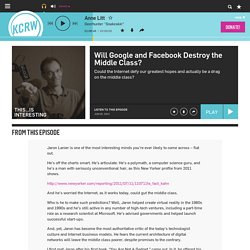
He’s off the charts smart. He’s articulate. He’s a polymath, a computer science guru, and he’s a man with seriously unconventional hair, as this New Yorker profile from 2011 shows. And he’s worried the Internet, as it works today, could gut the middle class. Who is he to make such predictions? And, yet, Jaron has become the most authoritative critic of the today’s technologist culture and Internet business models. I first met Jaron after his first book, “You Are Not A Gadget,” came out. You won’t get more outside the box than Jaron Lanier – but that’s exactly where we must go to find out how to cope with what’s coming.